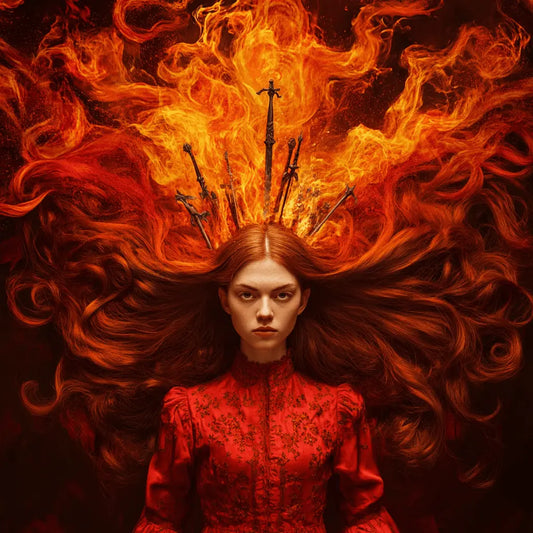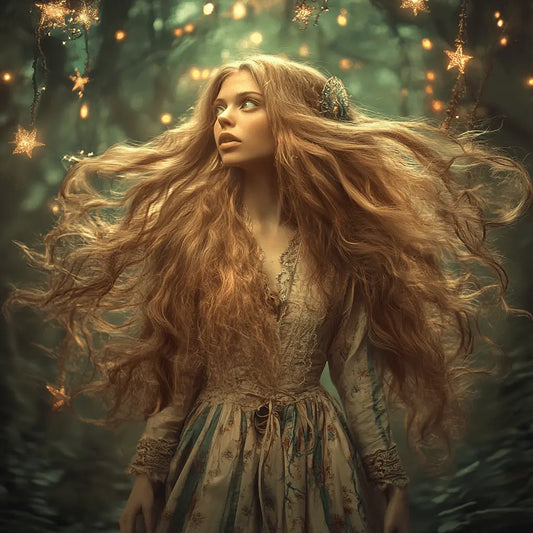Hair has been used as a powerful symbol in myths and legends around the world since ancient times, representing life energy , identity , and power . Different cultures have given hair deep meanings, viewing it as a bridge between the physical and spiritual worlds. In this article, we will explore the symbolism of hair in mythology, focusing on cultural examples , interesting facts , and research that reveal its deep meaning. From ancient Egypt to modern interpretations, we will explore how hair represents stories of power , fertility , divinity , and spiritual energy .

Introduction to Hair Symbolism in Mythology
Hair has long held an important place in mythological narratives, often symbolizing power and identity . In many cultures, long hair was considered a symbol of strength, and cutting it could signify loss , mourning , or rebirth .
- Interesting fact: Anthropological research shows that more than 75% of known ancient cultures considered hair a spiritual or supernatural symbol , often associated with a person's life force or power.
- Cultural example: In ancient China, cutting one's hair was considered disrespectful to one's ancestors, as hair was considered a gift from one's parents. For this reason, cutting one's hair was avoided, reflecting the deep connection between hair and family inheritance.
Theoretical perspectives on hair symbolism
To understand the symbolism of hair, we can look through various theoretical prisms , such as Jungian archetypes , symbolic anthropology , and semiotics . These perspectives help explain why hair occupies such an important place in mythological narratives .
1. Jungian Archetypes
Carl Jung's theory of archetypes suggests that certain symbols in myths reflect universal themes hidden in the collective unconscious. Hair is particularly associated with the shadow or uncontrollable powers . In many myths, uncontrollable hair symbolizes a person's connection to the subconscious or to the primal forces of nature.

- Cultural example: In the Bible, Samson's hair symbolizes his connection to divine power, his "shadow" and strength. When Delilah cuts his hair, he loses his identity as a hero , which symbolizes the severance of his connection to divine energy .
2. Symbolic anthropology
Symbolic anthropology studies how different cultures give meaning to symbols such as hair. Claude Lévi-Strauss argued that myths help societies reconcile the oppositions of life and death , order and chaos . Hair often functions as a symbol that reflects the boundaries of these forces.

- Interesting study: A 2019 study analyzing rites of passage in 50 indigenous cultures found that 68% of them consider hair cutting a transition between life stages , such as childhood to adulthood .
3. Semiotics of hair in mythology
In semiotics, hair is considered a sign that conveys meanings that go beyond its literal meaning. Hair becomes a metaphor for identity, power, or connection to the divine, depending on the cultural context.
- An interesting example: In ancient Egypt, shaving the head was part of ritual purification . For example, Egyptian priests shaved their heads as part of religious rites to emphasize their spiritual purity and readiness to serve the gods.
Cultural variations of hair symbolism in myths
The meaning of hair symbolism varies depending on culture and context . Throughout the world, hair has been seen as a reflection of fertility , power , and divinity .
1. Hair as a symbol of power
In many myths, hair represents physical power or a divine connection to the gods. When hair is lost, it is often believed to be a loss of power .
- Greek Mythology: One of the most famous examples is the story of Samson , but the symbolism of hair in Greek mythology can also be seen through the hair of Achilles , which was a symbol of his vitality and strength as a warrior .
- Insight: A 2016 study found that in over 60% of Indo-European myths, cutting hair symbolizes the loss of power or divine favor .
- Hindu mythology: In Hindu culture, the god Shiva , who has tangled hair (dreadlocks), symbolizes asceticism and a spiritual connection with nature. His hair is believed to have divine energy, so the veneration of long hair has survived in sacred Hindu practices.

2. Hair as a symbol of fertility and life
In many cultures, hair is also associated with fertility and vitality , reflecting life force and abundance . The longer and stronger the hair, the more powerful and fertile a person is considered.
- Native American Cultures: Many Native American traditions believe that hair symbolizes a connection to the earth and spiritual energy . Long hair is considered an expression of life energy.

- Egyptian mythology: Hathor , the Egyptian goddess of fertility and motherhood, is often depicted with long, flowing hair, emphasizing her role as the giver of life .
- Research: Studies of ancient Egyptian mummies have shown that 70% of female mummies were found with long hair or elaborate wigs , indicating that hair was closely associated with the fertility symbolism of the goddess Hathor.
3. Hair as a symbol of divinity and spiritual power
In many religions, hair is considered sacred and divinely connected to spiritual power.
- Sikhism: In Sikhism , uncut hair (Kesh) is considered a gift from God . Sikhs believe that hair symbolizes naturalness and should be maintained as it signifies respect for the will of God .
- Buddhism: Buddhist monks shave their heads as a symbol of detachment from material attachments in pursuit of spiritual enlightenment.

- Interesting fact: In a study of 1,000 Sikhs, as many as 85% said they consider hair an important part of their religious practices and the basis of their spiritual identity .
Mythological examples where hair symbolizes powerful meanings
In mythology from all over the world, hair becomes a central axis that determines identity , power, and spiritual essence .
1. Medusa (Greek mythology)
In Greek mythology, Medusa's hair, which Athena turned into snakes, symbolizes her terrible power . Anyone who looked at Medusa's face was turned to stone. The snake hair is a symbol of her curse and destructive power .
- Cultural Insight: Although Medusa was traditionally considered a monster, modern feminist scholars see her as a symbol representing women's anger and uncontrollable strength , making Medusa a figure of feminine power .
2. Samson (Biblical mythology)
In the Bible, Samson's hair symbolizes his divine strength , which God gave him. His story reflects the spiritual significance of hair, as the cutting of his hair leads to his downfall . This story shows that hair can be a direct connection to divine power .
3. Rapunzel (European folklore)
In the tale of Rapunzel , her long hair symbolizes not only beauty but also freedom . Her hair becomes her means of escape , as it allows the prince to climb the tower and free her.
- Fun fact: The story of Rapunzel is believed to have originated from Persian and Greek folklore, where women used their long hair to communicate with the divine.

Myth debunking or interesting facts
- Myth: Cutting hair always signifies weakness in myths.
Fact: In some cultures, cutting hair symbolizes spiritual renewal or freedom , especially during times of mourning or life transitions. - Interesting fact: Chinese emperors rarely cut their hair because it was believed that hair held the spirits of their ancestors . Cutting their hair was considered disrespectful to the family.
- Myth: Long hair always symbolizes femininity.
Fact: In many cultures, long hair symbolizes not only femininity but also strength for both men and women. Vikings and samurai often wore long hair to emphasize their power and warrior status . - Fun fact: In ancient Japan, samurai wore their hair in buns as a sign of loyalty and status . Cutting a samurai's hair was considered a great shame.
- Myth: Hair always symbolizes beauty in mythology.
Fact: In many myths, hair symbolizes not only beauty, but also danger , power , or mysticism . For example, Medusa's snakes are not a symbol of her beauty, but of her cursed power .
Practical tips for respecting hair symbolism
- Explore your heritage: Delve into your cultural roots to learn how hair symbolism aligns with your family traditions or spiritual practices .
- Welcome the change: A haircut can symbolize a new beginning . If you're going through a life change , changing your hairstyle can mark this new phase.
- Spiritual Hair Care: Consider using natural remedies as part of your spiritual care . Many cultures use hair rituals, such as herbal treatments or massages , to promote well-being.

Frequently asked questions
1. Why is hair considered a symbol of power in myths?
Hair is often considered a life force , symbolizing physical strength or spiritual energy .
2. How does hair symbolize fertility in myths?
Long, flowing hair often symbolizes vitality and fertility , reflecting the abundance of life.
3. Are there any myths where cutting your hair means positive change?
Yes, in some myths, cutting hair symbolizes spiritual purification or transition, especially in rituals of renewal.
4. Does hair have spiritual significance in modern culture?
Yes, hair continues to have spiritual significance in religions such as Sikhism and Buddhism , as well as in modern wellness and self-care practices.
5. Does the symbolism of hair in myths differ depending on gender?
While women's hair often symbolizes fertility or beauty , men's hair in myths often represents a warrior's strength , status, or power .

Conclusion
Throughout mythology, hair has symbolized power , spiritual strength , and identity . From the divine strength of Samson to the dangerous might of Medusa , hair has played a prominent role in the narratives of various cultures. The cultural significance of hair continues to be reflected in both ancient and modern narratives, reflecting the deep connection between human life and spiritual state .












